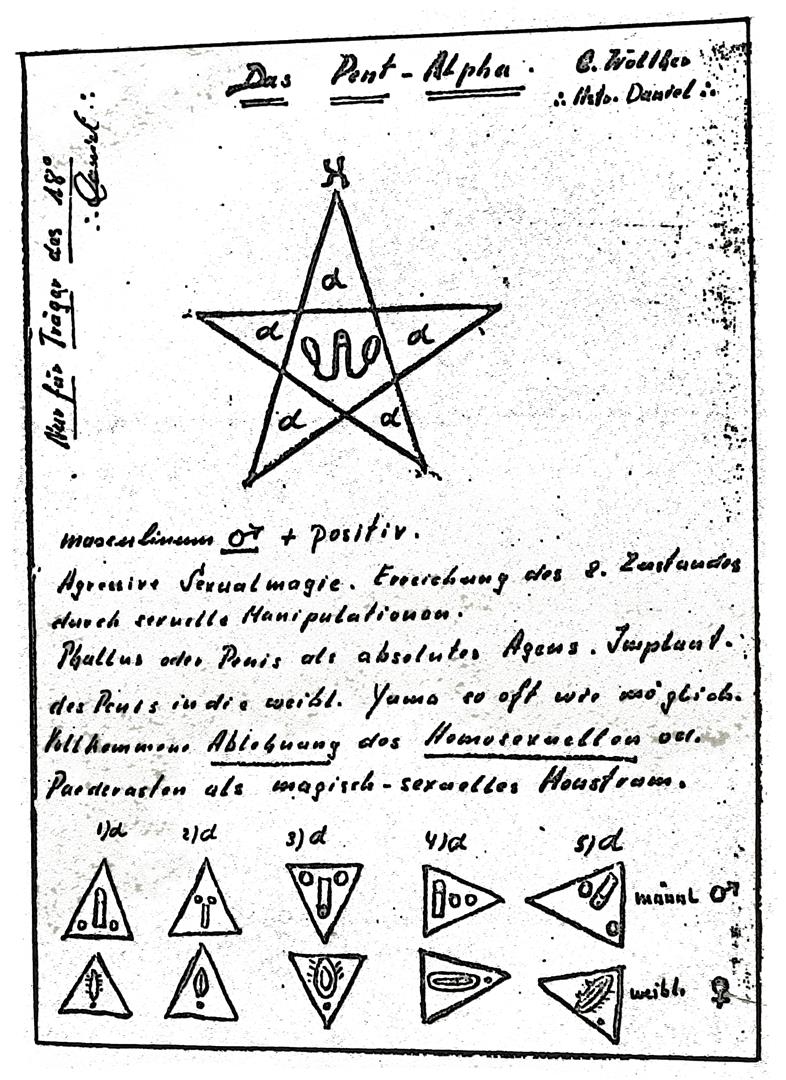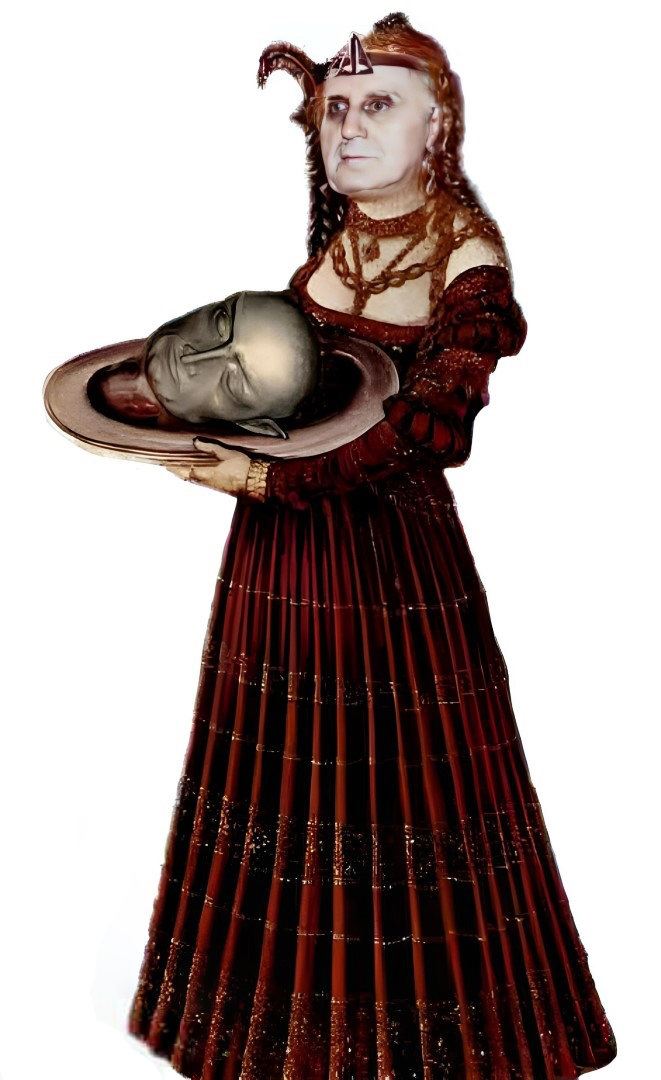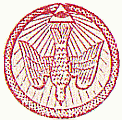Homophobia
Transgender in the Fraternitas Saturni

Homophobia in the Fraternitas Saturni.
18° Instruction issued by Grandmaster Guido Wolther / Frater Daniel.
Homosexuality is described therein as a “monstrosity”.
Guido Wolther’s contributions to heterosexual iconography are archived in this gallery.
TransgenderThe term gender is now generally used in the social and health sciences to denote the socially constructed rôles, behaviours, expressions and identities associated with being male, female, or gender–diverse; the term sex usually refers to biological characteristics such as chromosomes, hormones and reproductive anatomy, and is today often described more precisely as sex assigned at birth. In occult discourse around sex–magic the word sex also continues to carry its older connotations of semen, spermatozoa and reproductive fluids.Increasing awareness of the often clichéd occult tropes of sexuality, gender, male, female (and indeed the entire esoteric topography of the sexes and their various representations, together with spermo–gnosticism and sex–magic) has recently come under closer scrutiny in connection with transgender and gender–diverse practitioners. In contemporary clinical and sociological terminology, transgender functions as an umbrella term for people whose gender identity differs from the sex assigned to them at birth; older labels such as transsexual or transident survive mainly in medical or regional usage and are now used — if at all — only for those individuals who explicitly adopt them for themselves. The contrasting term cisgender denotes people whose gender identity corresponds to their sex assigned at birth. Besides the various O.T.O. groups getting more public attention in new media, new mindsets and internal guidelines on gender–specific issues have emerged to affect the traditionally rigid rôles still often inherent in occultism. Within contemporary Thelemic milieus, debates over gender identity, pronouns and ritual functions now intersect with discussions of non–binary identities, queer occultism and so–called gender modality (the relation between gender identity and sex assigned at birth). Here the O.T.O. stands out, because on the one hand it propagates a type of religious transcendence and proclaims that all are welcome, while on the other it still mimics traditional gender clichés in its rituals. In some O.T.O. jurisdictions diversity statements and educational material explicitly emphasise that participation is open to all people — trans, cis and gender–non-conforming — regardless of sexual orientation or gender identity. At the same time, the official rubric of Crowley’s Gnostic Catholic Mass (Liber XV Ecclesiae Gnosticae Catholicae Canon Missae) continues to presuppose a male Priest and a female Priestess, with non-binary members and some transgender people being steered towards intermediate rôles (Deacon, children, congregation). This tension between inclusive self–presentation and binary liturgical structure is one of the more visible current fault–lines in Thelemic practice. Crowley’s Gnostic Catholic Mass poses some knotty questions over the status of sperm and transgender people precisely because it dramatises a sacramental polarity between Solar Phallus and Goddess. For those who read the ritual in a strictly gender–essentialist way, the transmission of the sacrament seems to require a body coded as male (and at least in principle sperm-producing) in the rôle of Priest and a body coded as female in the rôle of Priestess. Others, including many queer and trans participants, simply transfer the biological aspect of semen and sperm, as well as the question of gender, to the symbolical level, where everything can — theoretically — be easily resolved. Whether the semen contains spermatozoa or not, whether the Priest or Priestess is cisgender or transgender, certain modern–day participants in the Gnostic Catholic Mass maintain that the only thing that really matters is what the congregation — regardless of their sexual organs and gender identity — actually experiences (or wants to experience) during Mass. From this perspective, sacral efficacy depends on consent, intention and embodiment, not on reproductive biology. Critics counter that a purely symbolic Mass ceases to be a catholic one in Crowley’s sense, because it dissolves the very sexual polarity the ritual was designed to stage. There are numerous discussions, conference papers and online polemics in progress on this thorny subject, with no sign yet of a resolution in sight. |

|
Within the Fraternitas Saturni the intricate topic of sperm is certainly not the key point around which lodge debates revolve; instead there appears to be a tacit agreement to leave all such matters safely within a general social context of personal freedom and responsibility. The present-day Saturn lodges that still draw, in varying degrees, on the FS tradition generally refrain from issuing programmatic statements on transgender or non-binary members; questions of gender identity tend to be negotiated pragmatically at lodge level rather than dogmatically from the top.
In 2005 a 36–year–old FS member ‘came out’ by revealing that she had undergone a male–to–female gender reassignment (today more usually termed gender affirmation), despite knowing all about the "homophobic attitude of some of my brothers." She went on to say, "How can I make people understand the great joy and happiness it was for me to be allowed to be as I feel? My special thanks go to my dear sisters who accepted me with amazing honesty and openness and who are now helping me adjust to being a woman in comfortable surroundings. I am aware just how unusual it must seem to some of my brothers and sisters — mainly to my brothers — how threatening it must seem to those who, perhaps, are afraid of feeling these same impulses in themselves, which contradict social norms. But I am not deceiving myself." Sadly, personal problems in the outside world cast a shadow over her membership, and since 2006 she has had to take time away from the Lodge. Her story nevertheless indicates how transgender embodiment in a Saturn lodge can simultaneously destabilise inherited homophobic reflexes and be integrated as a biographical fact of life by those brethren and sisters who see initiation as concerned with consciousness and Saturnian discipline rather than with policing genital configurations. |
"Deserving Death": Hans F. Senkel. Memphis–Misraim in Hamburg.
O.T.O. Phenomenon navigation page | main page | mail
What's New on the O.T.O. Phenomenon site?
|
|
|
|

